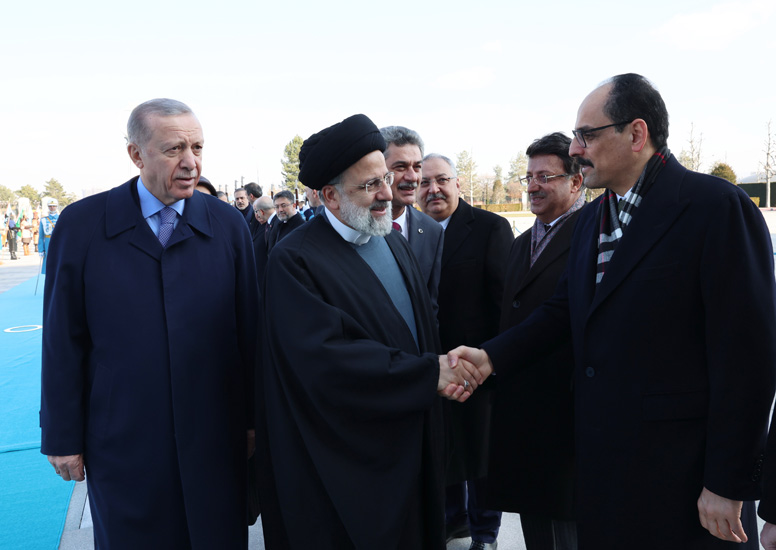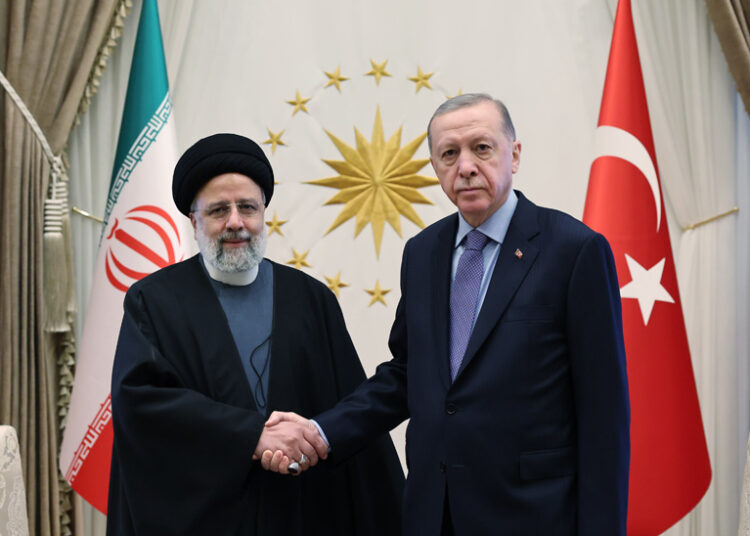Levent Kenez/Stockholm
Turkish President Recep Tayyip Erdogan, in a meeting with Iranian President Ebrahim Raisi during his visit to Ankara this week, stated that the trade volume between the two countries has not reached the desired level due to the sanctions imposed on Iran. Erdogan expressed disapproval of the Western sanctions, emphasizing the importance of cooperation in establishing security, stability and prosperity in the region.
President Erdogan reaffirmed Turkey’s commitment to the previously set goal of achieving $30 billion in trade volume with Iran, reflecting the understanding that economic cooperation is crucial for mutual benefit. He acknowledged that bilateral trade, which reached approximately $22 billion in 2012, has declined in recent years, attributing it to the sanctions on Iran and the global pandemic.
“The main reason for this decline has been the sanctions imposed on Iran and the pandemic. Although the pandemic is now behind us, the inhibiting effects of sanctions on trade persist. As Turkey, we consistently maintain our principled stance, expressing our disapproval of unilateral sanctions and emphasizing that resorting to such pressure tactics does not serve the intended purpose,” he said.
Erdogan underscored Turkey’s refusal to terminate its economic and trade relations with Iran despite the challenges posed by the sanctions, adding, “Due to the sanctions, we are currently facing issues in our business relations with Iran, especially stemming from the banking system. We hope that these and similar issues will be resolved promptly.”
During the Turkey-Iran Business Forum organized as part of President Raisi’s visit, Turkish Minister of Trade Ömer Bolat stated that a new customs gate would be opened between Turkey and Iran. He mentioned that once Iran completes the necessary preparations, the gate will be accessible for the transit of trucks. Bolat added that Turkey would continue to serve as a gateway to the West for Iran.
Furthermore, an agreement was reached between Turkey and Iran regarding the establishment of new free-trade zones.

As Erdogan navigates the challenges posed by US and EU sanctions imposed on Iran, his track record raises growing concerns about the effectiveness of his approach. Turkey assisted Iran in circumventing US sanctions through state-owned Turkish lender Halkbank, currently facing trial in New York federal court. The corruption scandal, exposed in 2013, revealed collaboration between President Erdogan, his family members and key ministers with Iranian-Turkish businessman Reza Zarrab to help Iran evade US sanctions. While Turkey had permission to sell food to Iran under the humanitarian exemption, the documents were falsified, and instead, gold and cash were sent to Iran in exchange for natural gas, with Halkbank acting as an intermediary agent.
Zarrab, arrested in Miami in 2016, cooperated with the prosecutor and testified in the 2017 trial of Halkbank’s deputy general manager, Mehmet Hakan Atilla. Zarrab confessed to his role in the scheme to help Iran evade sanctions and bribery to secure his release after his 2013 arrest in Turkey.
The Erdogan government dismissed the police chiefs and prosecutors who uncovered the scandal, accusing them of being affiliated with the Gülen movement, a critic of the Turkish government on various issues. In March 2019 they were sentenced to life in prison for allegedly attempting to overthrow the government.
In 2019 US federal prosecutors in the Southern District of New York indicted Turkish state lender Halkbank on six counts, including fraud, money laundering and sanctions offenses, related to its involvement in a multi-billion dollar scheme to evade US sanctions on Iran. The indictment outlined that between 2012 and 2016, Halkbank and its officers used money service businesses and front companies in Iran, Turkey, the United Arab Emirates and elsewhere to violate and evade prohibitions against Iran’s access to the US financial system. Halkbank knowingly facilitated the scheme, engaged in fraudulent transactions and lied to US regulators about its involvement.
A news report published by The New York Times on October 29, 2020 said the Turkish government and its officials engaged in lobbying for several years to dismiss the case against Halkbank. The article outlined that the administration of former US President Donald Trump, at the request of Erdogan, worked extensively for an extended period to get the charges against Halkbank dropped.

It was also noted that the same request had been conveyed to the Barack Obama administration. In August 2016, Erdogan allegedly asked the then-vice president Joe Biden, to dismiss Preet Bharara, at the time the US attorney for the Southern District of New York.
Simultaneously, Erdogan was reported to have sought the extradition of Zarrab.
There have been reports in the Turkish media suggesting that Erdogan tried to delay Sweden’s NATO membership in order to engage in negotiations with the Biden administration. It is claimed that these negotiations included the Halkbank case.
In April 2023 the US Supreme Court rejected Halkbank’s claim of sovereign immunity under the Foreign Sovereign Immunities Act (FSIA).
Nordic Monitor previously reported that there has been a notable surge in the creation of startup companies in Turkey by Russian and Iranian nationals, according to official statistics. This suggests a strategic move by Moscow and Tehran, viewing the Turkish market as a viable avenue to navigate and alleviate constraints imposed by Western sanctions.
Data from the Turkish Union of Chambers and Commodity Exchanges (TOBB) reveals that Russians led in establishing 592 new companies in Turkey from January to August 2023. Predominantly structured as limited liability companies, these ventures position Russians at the forefront of foreign investors creating enterprises in the Turkish market. In a similar trend, Iranians established 515 new businesses during the same period, with the majority structured as limited companies.
The majority of foreign-owned companies were classified under the category of “non-specialized wholesale trade,” indicating their establishment to engage in wholesale trade across a diverse range of products.












